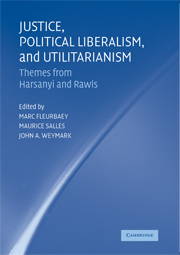Book contents
- Frontmatter
- Contents
- Preface
- List of Contributors
- 1 An Introduction to Justice, Political Liberalism, and Utilitarianism
- PART ONE THEMES FROM RAWLS
- PART TWO HARSANYI'S IMPARTIAL OBSERVER AND SOCIAL AGGREGATION THEOREMS
- PART THREE GOODNESS AND WELL-BEING
- 9 Can There Be a Preference-Based Utilitarianism?
- 10 Harsanyi, Rawls, and the Search for a Common Currency of Advantage
- 11 Utilitarianism versus Fairness in Welfare Economics
- 12 Rationality and Want-Satisfaction
- PART FOUR SHARING THE GAINS FROM SOCIAL COOPERATION
- PART FIVE RIGHTS AND LIBERTIES
- Index
12 - Rationality and Want-Satisfaction
Published online by Cambridge University Press: 09 February 2010
- Frontmatter
- Contents
- Preface
- List of Contributors
- 1 An Introduction to Justice, Political Liberalism, and Utilitarianism
- PART ONE THEMES FROM RAWLS
- PART TWO HARSANYI'S IMPARTIAL OBSERVER AND SOCIAL AGGREGATION THEOREMS
- PART THREE GOODNESS AND WELL-BEING
- 9 Can There Be a Preference-Based Utilitarianism?
- 10 Harsanyi, Rawls, and the Search for a Common Currency of Advantage
- 11 Utilitarianism versus Fairness in Welfare Economics
- 12 Rationality and Want-Satisfaction
- PART FOUR SHARING THE GAINS FROM SOCIAL COOPERATION
- PART FIVE RIGHTS AND LIBERTIES
- Index
Summary
Introduction
The proposition that I wish to defend in this chapter is that the satisfaction of wants is in general good. More precisely, I argue that this proposition is not vulnerable to two objections against it that are quite commonly made and widely regarded as decisive. Both objections turn on the way in which wants are formed. According to one, the satisfaction of wants is compromised by the phenomenon of adaptive preference formation: We tend to want what we can get and not what we cannot. According to the other, the proposition that want-satisfaction has value commits us to the counterintuitive claim that everybody must, on pain of irrationality, work to create in themselves (and in others for whom they are responsible) wants that are easily satisfied. I take the canonical statements of these two objections to have been made by Jon Elster and John Rawls, respectively, and it is their versions that I shall discuss.
Between them, these two objections suggest that there are serious problems with the idea that want-satisfaction is valuable. If we let nature take its course, changes in our preferences will occur “behind our backs,” as Elster puts it, in such a way as to bring them in line with what is available, and this (he supposes) casts doubt on the value of getting what we want. But if we intervene self-consciously in the formation of our preferences, Rawls is telling us that we must deliberately try to do even more effectively exactly what (according to Elster) tends to happen anyway.
- Type
- Chapter
- Information
- Justice, Political Liberalism, and UtilitarianismThemes from Harsanyi and Rawls, pp. 281 - 300Publisher: Cambridge University PressPrint publication year: 2008
- 1
- Cited by



